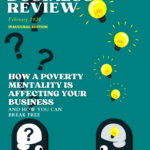
Embarking on a new business venture is like setting out on an exciting yet challenging journey. Launching and managing a business involves juggling finances, hiring the right people and getting them to work, innovating top-notch products, and making tough decisions. It’s a complex task, often challenging your mental resilience. The road isn’t easy; after all, worthwhile pursuits seldom are. It requires unwavering dedication and hard work to turn your ideas into a thriving reality, but if you’re resolute in your determination to succeed, the rewards that await you make the journey truly worthwhile.
While mastering various business aspects is pivotal, the importance of the right mental attitude cannot be overstated. Entrepreneurs must be vigilant against self-limiting and self-sabotaging mindsets that can impede business success. Among these is the poverty mentality – a mindset that can significantly hinder the growth and potential of a business. It’s crucial to cultivate a mindset of abundance and resilience, fostering a positive outlook even in the face of challenges. This mental fortitude is a powerful asset, enabling entrepreneurs to navigate the complexities of business with confidence and determination.
A poverty-minded business convinces itself that opportunities are scarce, that every ngwee spent brings the enterprise closer to financial ruin, and that risk is an unforgivable gamble. This breeds a constant apprehension that disaster looms over the horizon, reinforcing Murphy’s First Law- “Anything that can go wrong, will go wrong.” Consequently, a cloud of scarcity, fear, and even self-doubt often dictates the firm’s decision-making.
Recognising the Signs of a Poverty Mentality
In all fairness, it’s essential to acknowledge that growing up in certain environments unwittingly instils a scarcity mindset. Exposure to the harsh realities of poverty, like the kind we have in Zambia, can inadvertently erode the very qualities essential for entrepreneurial success. While external factors may contribute, there are tell-tale signs that shed light on a deeply ingrained poverty mentality. Here are some of them:
- The belief that success is an uphill battle: A scarcity mindset fuels the belief that success is an insurmountable challenge, perpetuating the idea that anything worth pursuing is destined to be difficult or insurmountable.
- Persistent money worries: Entrepreneurs trapped in a poverty mentality perpetually fear running out of funds, regardless of the available resources. While a firm’s burn rate should definitely be a concern, constantly worrying about money running out hinders founders from seeking sustainable solutions.
- Guilt around spending: A poverty mindset breeds guilt around spending money, even when investments promise long-term benefits.
- Decision-making driven by fear: Making choices based on fear and pessimism rather than data and rational analysis is a hallmark of a poverty mentality.
The Detrimental Impact on Business
Evidence replete in the literature underscores the detrimental impact of a poverty mentality on business growth. A poverty mentality infiltrates entrepreneurship on multiple fronts, hampering growth and stifling potential.
Firstly, businesses governed by this mindset tend to cut corners, thereby sacrificing the resources necessary for operational excellence. Slashed costs might mean inadequate budgets for essential areas like marketing, product innovation, and talent acquisition. Consequently, a lack of investment in these areas could result in underwhelming sales, a potential catastrophe for any business.
Moreover, poverty-minded enterprises inadvertently hinder their own expansion. Sustainable growth hinges on attracting a loyal customer base willing to invest in products or services. In tandem, innovation suffers. Such firms, mired in scarcity, fail to attract the finest talent, stunting innovation and product development.
Breaking Free and Fostering Abundance
The road to prosperity demands a shift in perspective. The emphasis on abundance transcends mere Pentecostal or ecclesiastical showmanship; it holds a pivotal role in the realm of business triumph. For entrepreneurs to thrive, they must break free from the shackles of a poverty mentality and embrace an abundance mindset. This transformative shift opens doors to innovation, investment, and growth. Our country depends on it.
In the forthcoming issues of Wisteria Business Review (WBR), we will delve deeper into strategies for overcoming the poverty mentality, unlocking potential, and fostering a mindset primed for success. WBR aims to provide fresh perspectives, actionable insights, and transformative stories that elevate your understanding of business, economics, and entrepreneurship. Together, we’ll unravel the nuances of success, challenging conventional wisdom and embracing the ever-evolving dynamics of the business world.
Here’s to a journey of empowerment, enlightenment, and limitless possibilities.
Stay tuned for more empowering insights in Wisteria Business Review.
- 13 Life Lessons I Learnt as a Teacher - July 23, 2024
- 13 Life Lessons I Learnt as a Teacher - July 22, 2024
- 13 Life Lessons I Learnt as a Teacher - July 21, 2024




Interesting read
Thank you for your readership.
Interesting